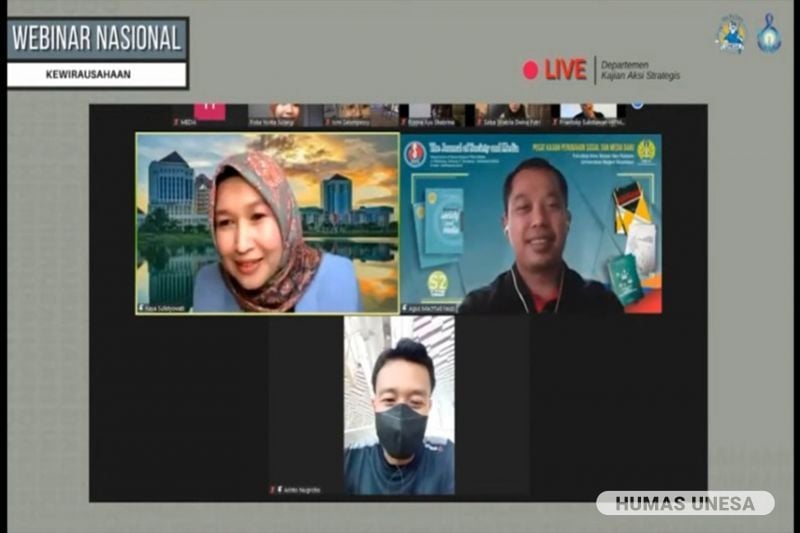
www.unesa.ac.id
UNESA.ac.id, SURABAYA-In collaboration with the Indonesian Young Entrepreneurs Association, UNESA held a National Entrepreneurship Webinar with the theme "Economic Development of the MSME Sector Post-pandemic" on November 20, 2021. This webinar invited 3 presenters, namely Dr. Agus Machfud, M.Si as UNESA Sociologist, then there is Priantoko Sulistiawan, S.H., M.H. as the administrator of HIPMI Surabaya and also Raya Sulistyowati, S.Pd., M.Pd. as a lecturer at the Faculty of Economics and Business UNESA.
This webinar was opened by Arinto Nugroho as the head of the Law Department, Faculty of Social Sciences and Law UNESA. He explained that the Covid-19 pandemic, which had entered Indonesian territory since early March last year, had a huge impact on the economic sector, especially on MSMEs. The percentage of 99% of the Indonesian population puts their life expectancy in the MSME sector.
Dr. Agus Machfud, M.Si said that the economic situation in Indonesia at the beginning of the pandemic was very worrying. Many people have an impact on reduced wages and massive layoffs and a decrease in the percentage of MSME income in Indonesia. However, this does not make young people out of their minds to revive the economy. Many things from the economic sector can actually adapt and develop rapidly during a pandemic, which is mostly done by young people to make a living.
MSMEs themselves have 7 important things, namely entrepreneurial leadership, management skills, use of technology, products and innovations, marketing, capital, and bookkeeping. Considering the sentence that is pinned by people to the young generation of Indonesia today, namely the laying down generation, this does not apply to entrepreneurship, namely "Millennials are Not Rebahan But Agents of Change," he said.
Meanwhile, Raya Sulistyowati, S.Pd., M.Pd., explained that in the development of technology which was originally 4.0 and then gradually began to shift towards 5.0, this is evidenced by the economic style that mostly leads to digitalization. Various human needs have widely applied the support of the internet and the digital world as a vehicle for interaction and transactions.
The era of "Society 5.0" itself is an era in which all humans focus on the balance of progress between the economy and technology by solving problems through systems that integrate cyberspace and physical space. As is the case today, several business models and jobs in Indonesia have been carried away by digitalization. Like conventional shops being replaced with online marketplaces, then there are traditional motorcycle taxis or public transportation that switch to online modes of transportation.
He explained that as many as 16.4 million MSMEs in Indonesia have entered Go-Digital mode, where the percentage has doubled during the pandemic. Not to forget, he also explained several important roles of MSMEs, including 1) as a support for the country's economy, 2) as a supplier for consumers or large companies, 3) as customers for large companies as part of the distribution chain.
In the next material session, Priantoko Sulistiawan, S.H., M.H., explained about rebranding. According to him, rebranding is a process of changing the corporate image of an organization. Rebranding itself is also a market strategy in giving a new name, symbol or design change for an established brand. While the idea behind rebranding is to create a different identity for a brand from its competitors in the market.
In addition, according to him, the function of rebranding itself is to connect with new audiences, differentiate yourself from competitors, stay up to date, reflect product goals and new offerings and values, as well as to increase profits for the business. (UNESA PR)
Reporter: Saputra, Fiona
Editor: @zam*
Share It On:






